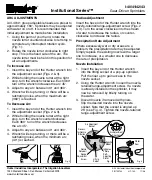
24
Navigation System
Getting Started
Viewing Flow Data
Traffic flow data is displayed as colored
bands on either side of the freeway (see
Traffic Display Legend
on page 22).
The different colored bands represent
the average road speeds as determined
by under-road sensors and other probes.
While driving to your destination on a
road that has traffic flow data, your
route line color is used to display the
traffic flow data. This means that when
the map scale is set to one of the traffic
scales (1/20 through 5 mile scale), your
blue route line may appear as alternating
orange, red, or green segments (see
Traffic Display Legend
on page 22).
NOTE:
A blue route line segment on a freeway
can mean one of two things:
• Under-road sensors, GPS probes, cell
phone probes, and other methods
used to collect traffic speed
information indicate free-flow traffic.
• The road has no sensors, and traffic
conditions are unknown (they could
be congested).
Naturally, only roads with these sensors
will show traffic information. The
amount of flow data varies considerably
from one city to another. This map
display is refreshed continuously. You
can only view traffic information in the
city where you are located.
NOTE:
• Traffic flow and incident icons are
displayed on the 5 miles (8 km) or
less map scale.
• Not all freeways within a
metropolitan area have traffic flow
data (colored bands on the side of the
freeways) - this is normal, and you
cannot assume that a lack of data
implies no traffic.
• Not all cities have traffic flow
information. See cities listed on
page 148.
• Due to freeway maintenance and
construction, traffic flow may be
available only for one side of a road,
or be missing entirely for some
portion of the freeway.
• The displayed traffic flow may
conflict with other audio- or Internet-
based traffic information.
• If traffic flow is not showing, verify
that the “TRAFFIC” selection for the
Icon Bar is ON, and that the icon
options for traffic are both ON (see
page 62).
















































